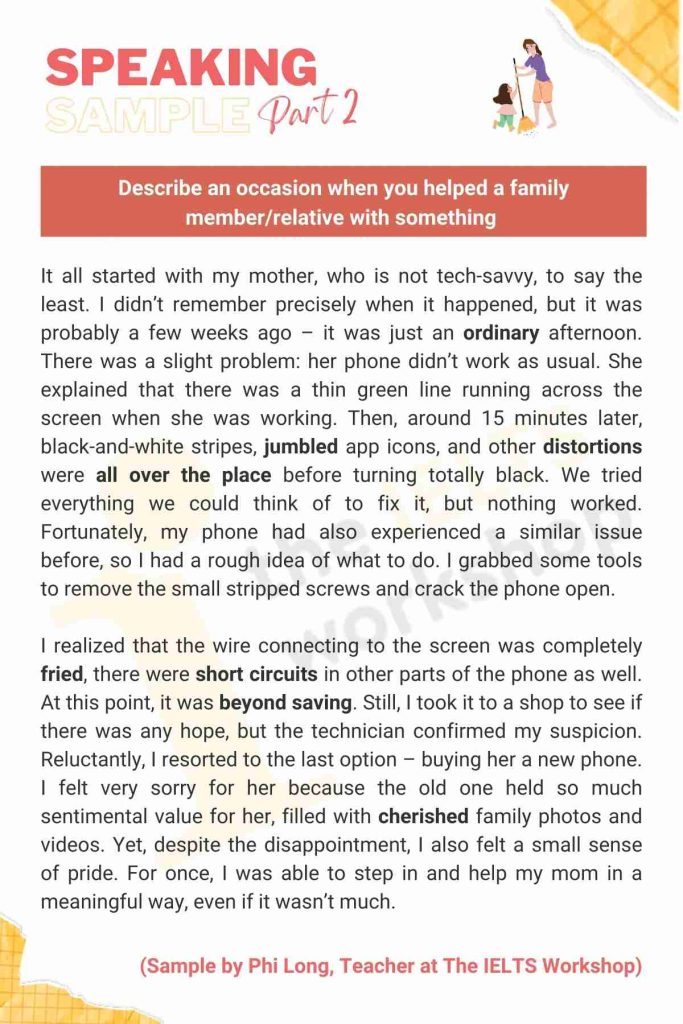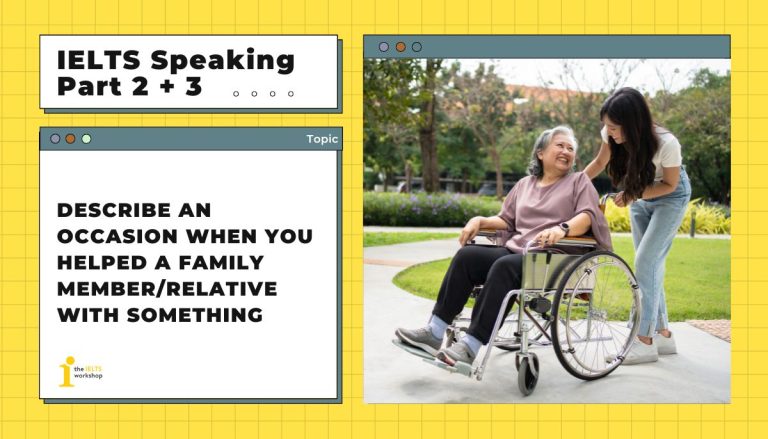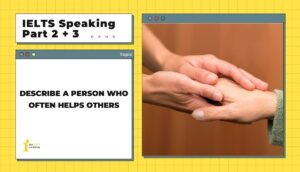Trong chuyên mục giải đề IELTS Speaking kỳ này, cùng tham khảo chủ đề: “Describe an occasion when you helped a family member/relative with something” qua bài mẫu của thầy Phi Long của The IELTS Workshop dưới đây nhé.
Part 2: Describe an occasion when you helped a family member/relative with something
Describe an occasion when you helped a family member/relative with something
You should say:
When it happened
Who you helped
How you helped
And explain how you felt about the experience
Dưới đây là bài mẫu cho topic “Describe an occasion when you helped a family member/relative with something”.
1. Bài mẫu (Sample)

2. Từ vựng (Vocabulary)
- Ordinary (adj): thông thường
- Jumbled (Adj): lộn xộn
- Distortions (n): sai hình
- All over the place: loạn hết lên
- Fried (adj): bị cháy
- Short circuit (n): đoản mạch
- Beyond saving: hết cứu
- Cherished (adj): quý giá
Part 3
How do people know that their neighbours might need help?
Do neighbours often help each other in your country?
Should parents reward their children when they help others?
What can children learn by helping others?
Should parents always help their children with everything?
How can children help their parents at home?
1. How do people know that their neighbours might need help?
In many circumstances, it can be a telltale sign. For instance, audible disruptions like alarms, smashing windows or constant banging on the wall showing that they’re in emergency situations. However, it’s not always the case. We need to be more observant sometimes to see if they have any problems, especially emotional ones. Changes in daily habits, facial expressions and speaking tone take time and consideration to be noticed.
- Telltale (adj): rõ mười mươi
- Observant (adj): chú ý, quan sát
- Facial expression: các biểu hiện cảm xúc trên mặt
2. Do neighbours often help each other in your country?
In my country, it’s quite common for neighbours to help one another. I guess it’s just in our culture, where individualism is not as strong as it is in Western countries. Moreover, the assistance can be seen in keeping an eye on each other’s homes when they are away, hosting a get-together for a bonding meal or providing emotional support. We believe that it’s such a great way to foster a supportive and harmonious atmosphere.
- Individualism (n): chủ nghĩa cá nhân
- Get-together (n): tụ họp
- Foster (v): thúc đẩy
- Harmonious (adj): hòa đồng
3. Should parents reward their children when they help others?
I think it’s okay to do so, but it’s essential to keep it in moderation. Rewards can incentivize children and show them the importance of being kind. However, parents should also educate children that helping other people should come from genuineness and empathy. The aim should be to nurture a sense of responsibility, so children learn to help others because they care, rather than simply to receive something in return.
- Incentivize (v): khích lệ
- genuieness (n): sự chân thành
- empathy (n): lòng cảm thông
4. What can children learn by helping others?
By helping others, children can gain valuable lessons. First, it would be a great chance for them to learn important virtues such as generosity, empathy and responsibility. Moreover, even when they fail to help, children can still understand that good deeds are always appreciated, which may teach them about gratitude.
- Virtues (n): phẩm chất tốt
- Appreciated (adj): trân trọng
5. Should parents always help their children with everything?
I don’t think that this is a good approach. This can make a child heavily dependent on others, resulting in the loss of crucial life skills like problem-solving, critical thinking and accountability. On the other hand, parents cannot be always available for them. Constantly helping their children only puts more burden on their already-hectic daily life.
- Accountability = responsibility (n): trách nhiệm
- Constantly (Adv): liên tục
- Already-hectic: vốn đã bận
6. How can children help their parents at home?
There is a variety of tasks that children can do to support their parents, depending on their age and capability. Simple tasks like doing household chores, buying groceries or other errands can always be done, even for younger children. However, for older ones, they can start taking on more serious responsibilities including taking care of themselves or other members of the family, especially toddlers and older people. They can also provide financial support if possible and allowed.
- Errands (n): việc vặt
- Toddlers (n): trẻ con
Bài mẫu bởi thầy Phi Long – Giáo viên The IELTS Workshop
Trên đây là bài mẫu cho topic: Describe an occasion when you helped a family member/relative with something. Các bạn có thể tham khảo các Bộ đề dự đoán IELTS Speaking mới nhất của The IELTS Workshop tại đây!
Tham khảo ngay khoá Senior của The IELTS Workshop để nâng cao khả năng Speaking của mình nhé.









